XXIX Meeting of the European Consortium for Church and State Research

Certosa di Pontignano
Localita Pontignano, 5
53019 Pontignano
Twenty-five years after the European Consortium meeting in Thessaloniki, the legal status of religious minorities in the European Union has changed as the result of two intertwined factors: (a) in society, new religious minorities have gained ground, often (but not exclusively) based on massive immigration; at the same time, secularization has led majorities to shrink, to the point that they are themselves becoming the new minorities. Traditional minorities are challenged from both sides: on the one hand the denominational majority with which they have been confronted for centuries is no longer as powerful in society, but remains very influential, and increasingly so as the bearer of a threatened national culture and identity; on the other hand new minorities have grown in number and influence, due to their social salience, institutional dynamism and readiness to assert their influence through judicial and other processes; (b) in the law, the status of traditional minorities has generally improved, thanks to national, European and international legal developments, whereas the status of new minorities is very much under discussion (just think of Islamic communities or the Church of Scientology). The meeting of the European Consortium will investigate legal repercussions of social change on the status of old and new minorities in the European Union, in both domestic and European law. In previous meetings the Consortium has systematically analyzed the legal status of religious communities in key areas. Therefore the meeting will not aim at drawing an exhaustive picture thereof, but at investigating past and future developments, comparing the status of different communities and discuss inequalities, claims and strategies.